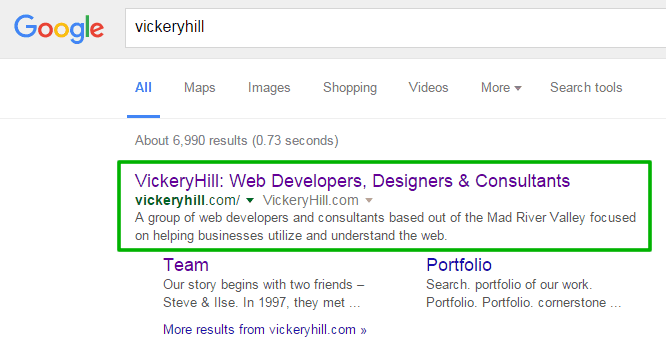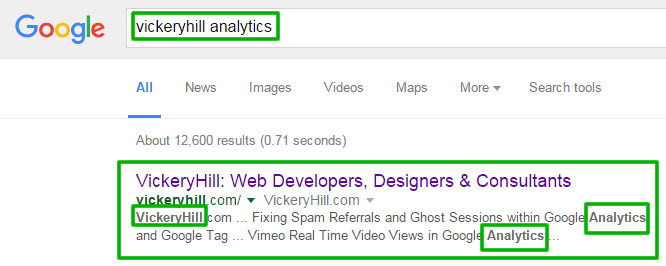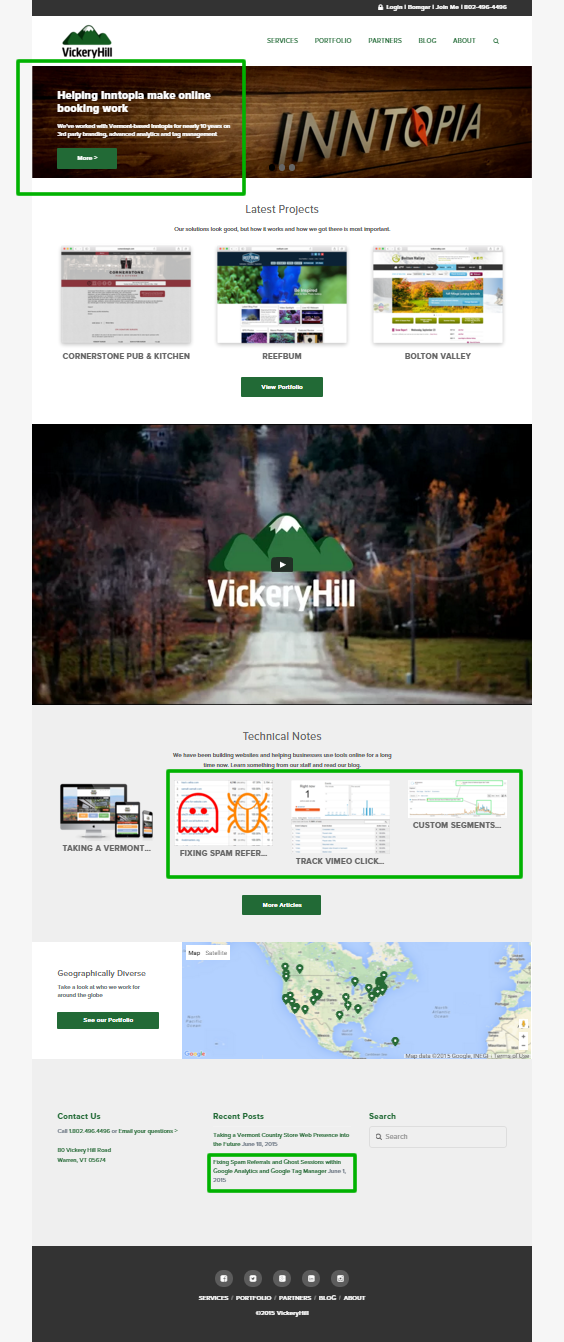Why Isn’t Google Using My Website’s Meta Title & Description?
Many years ago, a website’s administrator could control how their website’s title and description would display in Google organic search results using the meta title and meta description fields.
<title>Web Developers, Designers & Consultants | VickeryHill</title>
<meta name=”description” content=”A group of web developers and consultants based out of the Mad River Valley focused on helping businesses utilize and understand the web.” />

Then a few years ago Google modified its algorithm to allow for other content on the site to play into the site’s search results, if it was relevant to the search query. The website owner lost control of how it displays in search engines BUT the algorithm changes allow for better results for the user and provides dynamic content in Organic Google Search for your website – thus hopefully making your website more accessible to a broader number of relevant search queries.
In the second example, you can see the same results (vickeryhill.com/home) displayed tailored to match and be relevant to the visitor’s search query. Content is pulled from a recent blog post on a feed on the home page about “analytics”.

Google organic search results for our business name “VickeryHill” and “analytics”.
Below is a screen shot of the content items related to “Analytics” that Google used to match relevance of “analytics” and “vickeryhill” in the organic search results above.

Vickeryhill.com home page with “analytics” related content.
Search Results for your site from other websites?
That’s right. We were all dumbfounded after realizing this was possible. But it makes sense if you consider Google’s Business Philosophy which starts with the following practice:
“Focus on the user and all else will follow.”
“(continued)…Since the beginning, we’ve focused on providing the best user experience possible. Whether we’re designing a new Internet browser or a new tweak to the look of the homepage, we take great care to ensure that they will ultimately serve you, rather than our own internal goal or bottom line. Our homepage interface is clear and simple, and pages load instantly. Placement in search results is never sold to anyone, and advertising is not only clearly marked as such, it offers relevant content and is not distracting. And when we build new tools and applications, we believe they should work so well you don’t have to consider how they might have been designed differently.”
“…we believe they should work so well you don’t have to consider how they might have been designed differently…”
 In laymen’s terms, if you don’t have very good meta titles and descriptions, and your pages content is heavily image based and lacks enough content in terms of content<h1>, <h2>, <p>, Google in effect says, ‘we’ll that is weak but your website is obviously the best result based on other authority metrics. What else do we have on those search results that will make this a better user experience for the person who just searched? Oh, I see 200 websites all saying something very consistent about the website of authority concerning the search term they requested, lets serve that instead of your websites lackluster meta content.’
In laymen’s terms, if you don’t have very good meta titles and descriptions, and your pages content is heavily image based and lacks enough content in terms of content<h1>, <h2>, <p>, Google in effect says, ‘we’ll that is weak but your website is obviously the best result based on other authority metrics. What else do we have on those search results that will make this a better user experience for the person who just searched? Oh, I see 200 websites all saying something very consistent about the website of authority concerning the search term they requested, lets serve that instead of your websites lackluster meta content.’
We stick by our basic rule of thumb – CIKASS – Content Is King, Authentic Stories Sell. Of course you still need to put in relevant meta titles and descriptions on your site, but the content of the site now matters even more. Write what the intended visitor wants to hear. Tell authentic stories. Be the ball Danny.
We agree with Google’s practices here. Visitor first. Authority will follow along with the success of your online presence.
Need help with your web presence?
Give us a call or email us for a free 30-minute consultation. Seriously. We love this stuff!
